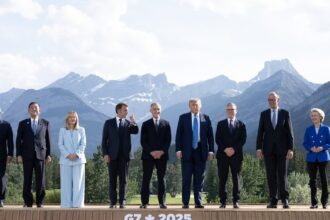In a bold move that could reshape Canada’s economic landscape, Saskatchewan Premier Scott Moe has called on provincial leaders to broaden the existing New West Partnership Trade Agreement (NWPTA), potentially creating a more unified economic bloc to counter federal policies many western provinces find restrictive.
Speaking at a press conference in Regina on Thursday, Moe emphasized that expanding interprovincial cooperation isn’t merely about economic gain but represents a strategic response to what he describes as “overreaching federal initiatives” that have strained provincial autonomy.
“When Ottawa continues to implement policies that hamper our resource development and economic growth, we must find innovative ways to strengthen our position,” Moe stated. “Expanding the NWPTA would create a more formidable economic alliance that respects the distinct needs of our regions.”
The current agreement, established in 2010, includes British Columbia, Alberta, Saskatchewan, and Manitoba, creating a free-trade zone of more than 11 million people with a combined GDP exceeding $750 billion. Moe’s vision would potentially extend this framework to include Ontario and other interested provinces, dramatically increasing the agreement’s economic influence.
Economic analysts suggest such an expansion could yield substantial benefits. Dr. Martha Reynolds, economist at the University of Calgary, notes, “An expanded interprovincial trade agreement could eliminate an estimated $130 billion in internal trade barriers that currently fragment Canada’s economy.”
The proposal comes amid escalating tensions between western provinces and the federal government over energy policy, carbon taxation, and resource development. A recent survey by the Canada West Foundation found that 68% of western Canadian business leaders believe federal regulations have negatively impacted their growth prospects.
Reaction from other provincial leaders has been cautiously optimistic. Alberta Premier Danielle Smith expressed support for the concept, stating, “Anything that strengthens our collective economic sovereignty deserves serious consideration.” Meanwhile, Ontario officials have indicated openness to discussions while emphasizing that any agreement must respect their province’s distinct economic priorities.
Federal Minister of Intergovernmental Affairs Dominic LeBlanc responded by urging provinces to work within existing frameworks, reminding that “the Canadian Free Trade Agreement already provides a national foundation for reducing trade barriers.”
Critics of Moe’s proposal, including environmental advocacy groups, have raised concerns that an expanded agreement could potentially undermine environmental standards and climate commitments. Sierra Club spokesperson Jennifer Warren cautioned, “We need to ensure that economic integration doesn’t come at the expense of environmental protections.”
Business leaders across western Canada, however, have largely embraced the concept. The Canadian Federation of Independent Business estimates that internal trade barriers cost the Canadian economy between $50-130 billion annually, with small and medium-sized enterprises disproportionately affected.
Constitutional experts note that while provinces have considerable latitude to form economic agreements, certain aspects of interprovincial trade remain under federal jurisdiction. “The provinces can go quite far in harmonizing regulations and reducing barriers,” explains Dr. Kenneth Thompson, constitutional law professor at Queen’s University, “but they cannot encroach on areas of clear federal authority like international trade.”
As provincial leaders consider Moe’s proposal, the fundamental question remains: can an expanded interprovincial agreement effectively balance regional economic interests while maintaining the cohesion of the broader Canadian federation in an increasingly polarized political climate?

























